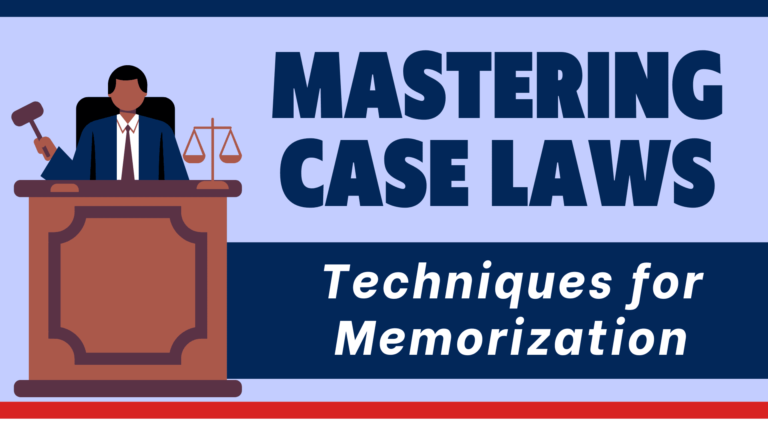The most Important Subjects for Judiciary Exam

If you’re planning to pursue a career in the judiciary, passing the Judiciary Exam is a crucial step towards achieving your goal. The Judiciary Exam is a highly competitive exam that tests candidates on their knowledge of various legal subjects.
To help you prepare for this exam, it’s important to know the most important subjects that are likely to be covered.

The Judiciary Exam is conducted in several stages, including a preliminary exam, mains exam, and an interview.
To be eligible to take this exam, you must meet certain criteria, such as having a law degree. It’s also important to note that different states may have different eligibility criteria, so it’s important to check the requirements of the state you’re interested in.
One of the most important aspects of preparing for the Judiciary Exam is knowing which subjects to focus on. The exam typically covers a wide range of legal subjects, including constitutional law, criminal laws, civil laws, and more.
By focusing on the most important subjects, you can increase your chances of success and ensure that you’re well-prepared for the exam.
Page Contents
Judiciary Exam Overview

If you are planning to pursue a career in the field of law and aspire to become a judge, then appearing for the Judiciary Exam is a must. The Judiciary Exam is conducted to recruit candidates for the post of Civil Judge, Junior Division or Judicial Magistrate or Higher Judiciary.
Stages of Examination
The Judiciary Exam consists of three stages – Preliminary Examination, Mains Exam, and Interview.
The Preliminary Examination is an objective type test that assesses your knowledge in various subjects such as General Knowledge, English, and Law.
The Mains Exam is a subjective type test that evaluates your skills in drafting, writing, and problem-solving. The Interview is the final stage of the examination, where your personality, communication skills, and knowledge are evaluated.
Eligibility and Age Limit
To be eligible for the Judiciary Exam, you must possess a Bachelor’s degree in Law from a recognized university.
The age limit for appearing in the examination varies from state to state, but generally, the minimum age limit is 21 years and the maximum age limit is 35 years. (exemption is there for reserved category)
The Judiciary Exam is a highly competitive examination that requires thorough preparation and dedication. By understanding the stages of the examination and the eligibility criteria, you can start preparing for the examination in a systematic manner.
Important Subjects and Topics

Preparing for the Judiciary Exam requires a thorough understanding of various subjects and topics. Here are some of the most important ones that you must focus on:
Constitutional Law
The Constitution of India serves as the supreme law of the land, laying down the framework for the governance of the country. For any judiciary exam, it is crucial to have a comprehensive understanding of the fundamental rights and duties enshrined in the Constitution, as well as the various articles related to the powers and functions of the judiciary.
The fundamental rights, guaranteed by the Constitution, include the right to equality, right to freedom, right against exploitation, right to freedom of religion, cultural and educational rights, and the right to constitutional remedies. These rights form the bedrock of the Indian legal system and are essential for upholding the principles of justice and equality.
In addition to fundamental rights, the Constitution also outlines the directive principles of state policy, which provide guidance to the state in matters of policy and governance, aiming to establish a welfare state and promote social justice.
Understanding the various articles related to the powers and functions of the judiciary is equally important. These include provisions related to the independence of the judiciary, the appointment and removal of judges, the jurisdiction of the Supreme Court and High Courts, and the power of judicial review. A thorough grasp of these articles is essential for aspiring judges and legal professionals to effectively interpret and uphold the law.
A comprehensive understanding of the Constitution of India is indispensable for any judiciary exam. It forms the basis for the legal framework of the country and provides the foundation for upholding justice, equality, and the rule of law.
Substantive and Procedural Laws
Substantive laws form the foundation of rights and obligations for individuals and entities within a legal system, while procedural laws govern the processes and rules to be followed in legal proceedings. A comprehensive understanding of both substantive and procedural laws, including the Civil Procedure Code (CPC) and the Criminal Procedure Code (CrPC), is essential for legal professionals and anyone preparing for examinations related to the judiciary or legal system.
Substantive laws encompass a wide range of legal principles and rules that define the rights and responsibilities of individuals and entities. These laws address various aspects of civil and criminal matters, such as property rights, contracts, torts, family law, business law, and more. Understanding substantive laws is crucial for interpreting and applying legal principles in specific cases to determine rights and liabilities.
On the other hand, procedural laws lay down the rules and processes that must be followed in legal proceedings. This includes the methods for initiating and conducting a lawsuit, presenting evidence, examining witnesses, and reaching a judgment. The Civil Procedure Code (CPC) governs the procedural aspects of civil cases, while the Criminal Procedure Code (CrPC) regulates the procedures for criminal cases.
The Civil Procedure Code (CPC) provides the framework for conducting civil suits, including jurisdiction, pleadings, trial, and execution of decrees. It outlines the procedures to be followed by civil courts at different stages of a civil case, ensuring fair and efficient resolution of disputes.
Similarly, the Criminal Procedure Code (CrPC) sets out the procedures for the investigation and trial of criminal cases. It covers aspects such as arrest, bail, investigation, trial, and sentencing, ensuring that the rights of the accused are protected and justice is served.
A thorough understanding of both substantive and procedural laws, including the Civil Procedure Code (CPC) and the Criminal Procedure Code (CrPC), is essential for anyone involved in the legal profession or preparing for judiciary exams. This knowledge forms the basis for effectively navigating the legal system, upholding justice, and ensuring the rights of individuals are protected within the framework of the law.
Civil Laws
Civil laws deal with disputes between individuals or organizations, such as property disputes, contract disputes, and family law matters. You must have a good understanding of the various civil laws, including the Indian Contract Act, the Indian Partnership Act, and the Hindu Succession Act.
Criminal Laws
Criminal laws deal with offenses committed against the state or society, such as murder, theft, and fraud. You must have a good understanding of the various criminal laws, including the Indian Penal Code (IPC) and the Criminal Law Amendment Act.
Current Affairs and General Knowledge
Staying up-to-date with current affairs and general knowledge is essential for anyone preparing for a judiciary exam or pursuing a career in the legal profession.
In addition to legal knowledge, a well-rounded understanding of current events, political and economic developments, and important national and international organizations is crucial for a comprehensive understanding of the context in which legal decisions are made.
Knowledge of current events allows legal professionals to understand the broader societal and political landscape in which legal issues arise. This includes being aware of major national and international news, geopolitical developments, and significant socio-economic changes.
Understanding current affairs enables legal professionals to appreciate the real-world implications of legal decisions and the potential impact of legislative changes on society.
Political and economic developments play a significant role in shaping the legal environment. Familiarity with political structures, government policies, and economic trends provides valuable context for understanding the interplay between law and governance.
It also helps legal professionals comprehend the underlying motivations behind legislative initiatives and judicial decisions.
Furthermore, having knowledge of important national and international organizations is crucial for understanding the global context in which legal issues may arise. This includes awareness of the roles and functions of organizations such as the United Nations, World Trade Organization, International Court of Justice, and regional bodies like the European Union or African Union.
Understanding the mandates and activities of these organizations is essential for comprehending the broader framework within which international law operates.
While legal knowledge forms the core of preparation for judiciary exams and legal practice, staying up-to-date with current affairs and general knowledge is equally important. This broader awareness provides valuable context for legal decision-making, enhances the ability to analyze legal issues in their real-world context, and fosters a deeper understanding of the societal, political, and economic factors that influence the legal landscape.
To summarize, the Judiciary Exam requires a comprehensive understanding of various legal subjects and topics, as well as current affairs and general knowledge. By focusing on these important subjects and topics, you can increase your chances of success in the exam.
Study Materials and Resources
Preparing for the Judiciary Exam requires a lot of hard work and dedication. One of the most important aspects of preparation is having access to the right study materials and resources. In this section, we will discuss some of the most recommended books and bare acts that can help you ace the Judiciary Exam.
Recommended Books
There are numerous books available in the market that claim to be the best for Judiciary Exam preparation. However, it is important to choose the right ones that cover the relevant topics comprehensively. Here are some of the most recommended books for Judiciary Exam preparation:
- “The Indian Evidence Act” by Ratanlal and Dhirajlal
- “The Code of Criminal Procedure” by Ratanlal and Dhirajlal
- “The Transfer of Property Act” by R.K. Sinha
- “Constitution of India” by D.D. Basu
- “Law of Torts” by R.K. Bangia
These books cover the important topics in detail and provide a comprehensive understanding of the subjects. Make sure to read these books thoroughly and take notes to revise later.
Bare Acts and Legislation
Bare Acts and legislation are important resources for Judiciary Exam preparation. They provide a detailed understanding of the laws and regulations that govern the Indian legal system. Some of the most important bare acts and legislation that you should study for the Judiciary Exam are:
- The Indian Evidence Act, 1872
- The Code of Criminal Procedure, 1973
- The Transfer of Property Act, 1882
- The Indian Contract Act, 1872
- The Limitation Act, 1963
Make sure to read these bare acts and legislation thoroughly and understand the key provisions. It is also important to keep yourself updated with any changes or amendments made to these acts and legislation.
In conclusion, having access to the right study materials and resources is crucial for Judiciary Exam preparation. Make sure to choose the right books and study the relevant bare acts and legislation thoroughly to increase your chances of success.
Preparation Strategy
Preparing for Judiciary exams can be a daunting task, but with the right strategy, you can ace the exam with ease. Here are a few tips to help you prepare for the exam.
Time Management and Planning
Effective time management is crucial for success in any exam, and Judiciary exams are no exception. You need to create a study plan that works for you and stick to it. Divide your study time into manageable chunks, and allocate more time to subjects that you find difficult.
Create a schedule that allows you to cover all the topics in the syllabus, and set aside time for practice tests and revision. Make sure you take breaks in between study sessions to avoid burnout.
Mock Tests and Previous Papers
Mock tests and previous papers are an essential part of your preparation. They give you an idea of the exam pattern and help you identify your strengths and weaknesses. Take as many mock tests as possible, and analyze your performance to identify areas where you need to improve.
Solve previous year’s papers to get a sense of the types of questions that are asked in the exam. This will help you understand the exam pattern and prepare accordingly.
Practice and Revision
Practice makes perfect, and this holds true for Judiciary exams as well. Solve as many practice questions as possible to improve your speed and accuracy. This will also help you identify areas where you need to improve.
Revision is also crucial for success in the exam. Make sure you revise all the topics in the syllabus and focus on areas that you find difficult. Create summary notes for quick revision and revise them regularly.
By following these tips, you can prepare effectively for the Judiciary exam and increase your chances of success. Remember to stay focused and dedicated, and success will be yours.
Career Path and Opportunities
If you are considering taking the Judiciary Exam, it is essential to understand the career path and opportunities available to you after passing the exam. Here are some of the most common career paths that you can pursue:
Civil Judge and Higher Judiciary
Once you pass the Judiciary Exam, you can become a civil judge in the lower judiciary or aspire to become a judge in the higher judiciary.
Advocacy and Legal Jobs
Another career path that you can pursue after passing the Judiciary Exam is advocacy. As an advocate, you will represent clients in court and provide legal advice and guidance. You can also explore other legal jobs such as legal advisor, legal consultant, legal analyst, and legal researcher.
Here is a table that summarizes the career paths and opportunities available to you after passing the Judiciary Exam:
| Career Path | Description |
|---|---|
| Civil Judge | Hear cases in the lower judiciary |
| Higher Judiciary | Hear complex cases and make significant decisions |
| Advocacy | Represent clients in court and provide legal advice |
| Legal Jobs | Explore other legal jobs such as legal advisor, legal consultant, legal analyst, and legal researcher |
To conclude, passing the Judiciary Exam opens up various career paths and opportunities for you. Whether you choose to become a civil judge, aspire to become a judge in the higher judiciary, or pursue a career in advocacy or legal jobs, the Judiciary Exam is the first step towards a successful career in the legal field.
Conclusion
Preparing for the Judiciary Exam requires a thorough understanding of various subjects such as Indian Constitution, Indian Penal Code, Civil Procedure Code, Criminal Procedure Code, and Evidence Act, among others.
As a student, you need to focus on building a strong foundation in these subjects by studying from reliable sources and practicing previous year question papers.
Recruitment for the Judiciary Exam is conducted by various Public Service Commissions, and it is essential to keep yourself updated with the latest notifications and exam patterns.
Overall, the Judiciary Exam is a crucial step towards a career in the judiciary, and it requires dedication, hard work, and a clear understanding of the subjects. By following the right approach and staying focused, you can achieve success in this exam and fulfill your dream of serving as a judge.







